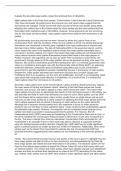Evaluate the view that major parties remain the dominant force in UK politics
Major parties refer to the three main parties, Conservatives, Labour and the Liberal Democrats.
They have dominated UK politics since the post-war era, and recent views suggest that this
dominance has changed. These views have arisen due to the three main parties losing seats,
adapting their politice due to the threats posed by minor parties and the minor parties that had
dominated other institutions part of UK politics. However, these arguments are not convincing
and as this essay will demonstrate, major parties indeed have retained their dominance in UK
politics.
All governments since the post war era were “formed by either the Labour Party of the
Conservative Party” with the exception of the Con-Lib coalition in 2010- the Liberal Democrats
themselves not considered a minority party- highlights how major parties play a massive and
dominant role in British politics. The lack of third parties MPs in the executive branch, and the
minor impact they have in the legislative branch shows how major parties essentially hold a
monopoly in decision making. As a result, this means that major parties are not threatened by
minor parties because minor parties themselves present little threat to the major players in
Politics. However, this argument can be seen as weak. This is because in recent times, the
government- though made up of the major parties- are not as dominant as they once were. For
instance, the current Conservative government starting from 2017 is a minority government and
relies on a confidence and supply vote with the Democratic Unionist Party (DUP), an extremely
small and otherwise unimportant party is therefore being relied upon by the Conservative
government to get their legislations passed- highlighting the loss in dominance of major parties.
Despite this, major parties still retain their dominance because the Con-DUP Supply and
Confidence Pact is an exception, not the norm and additionally, the DUP is not completely relied
upon given their extremely small influence in Parliament. As a result of this, it is evident that
major parties retain their dominance in UK politics.
Secondly, major parties such as the Conservatives, Labour and the Liberal Democrats “capture
the main issues of the day and present choice” referring to fact that these parties are ‘broad
churches’ and as such, are able to appeal to many voters across the nation. This means that
major parties not only have an advantage that results in their dominance power in UK politics, but
also that they are likely to retain that dominance for years to come. Minor parties such as UKIP
and the Greens fail to capture many voters as they usually focus on single issues and as such,
many do not see minor parties as a viable solution for replacing the three major parties given the
minor parties apparent lack of interest in focusing on wider policies as the nation demands.
Although this is because minority parties find it too expensive to focus on wider issues for
elections they are not likely to make significant gains, it only reinforces their undesirability against
the desirable major parties. However, this argument can be considered weak because minor
parties have been successful in swaying government’s policies. For instance, the UK
Independence Party (UKIP) were seen as threatening to the Conservative Party and as such, in
the 2015 manifesto the Conservative Party promised a referendum on the UK’s membership in
the EU. This was a change from what the mainstream Conservative Party advocated for, yet
nonetheless is an example of how a minor party was able to influence a supposed dominant
party into looking towards another direction. Despite this, UKIP itself has not made significant
gains in political systems as evident by their lack of MPs in Parliament. Additionally, other minor
parties such as the Green Party have failed to replicate the sort of success that UKIP had
produced therefore suggesting that minor parties are not threatening to the dominant parties at
all.
Finally, “the current electoral system favours few parties in the race to govern” highlights how the
three major parties are able to hold on to their dominance, and demonstrates the fact that the
three major parties are indeed dominant themselves in UK politics. The electoral system of First
Past the Post allows major parties to exploit the ‘Winner Takes All’ bonus that comes with such
an electoral system. This means that major parties which have already enjoyed such established
success are likely to continue their dominance by virtue of the FPTP advocating for the status
quo. Indeed, minor parties such as UKIP were unable to make significant gains and other parties




